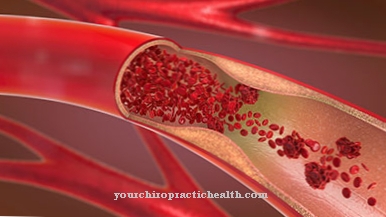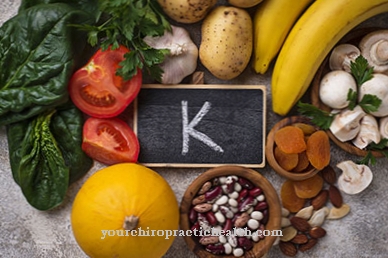A poisoning or Intoxication is a pathological dysfunction that has been caused by various types of poisons (toxins). These toxins mostly penetrate the human bloodstream and can cause serious illnesses. If left untreated, poisoning can often lead to death. From this it can be concluded that a doctor or hospital should be consulted as soon as possible in the event of poisoning.
What is poisoning?
As poisoning is the term used to describe the absorption of a toxic substance in quantities that are life-threatening or at least very risky to health and can lead to complications and permanent damage. Any substance that has a significant negative impact on human health and, for example, can result in the failure or impairment of organs, can be used as a trigger for poisoning. The life-threatening circumstances of poisoning usually result from these circumstances.
Typical and frequently occurring poisonings in humans are mushroom poisoning and food poisoning. But poisoning from contaminated water is also not uncommon. The poison of a snake or other animals can also cause poisoning in humans.
causes
Each substance, the one poisoning can trigger, affects different chemical circuits in the human body. The basic process begins with the toxin interrupting the biochemical reaction process, for example by binding to a receptor instead of the body's own substance and preventing the process from functioning. This form of poisoning often occurs when the toxin paralyzes the nerves - causing severe damage, such as cardiac or respiratory arrest, which can be a cause of death.
Other toxins are harmful because, for example, they block muscle cells and cause the heart and respiratory muscles to fail and people thereby die. Poisoning always occurs when there are enough pollutants in the human body to cause symptoms. For some substances, even the smallest amounts are sufficient, for example in the case of botulinum toxin. However, poisoning can also result from other substances that are not inherently toxic, but can cause poisoning if they pollute the body in too large quantities - these include iron, arsenic and ethanol, for example.
Frequent poisoning
- Food poisoning
- Alcohol poisoning
- Mushroom poisoning
- Snake bite poisoning
- Salmonella poisoning
- Heavy metal poisoning
Symptoms, ailments & signs
Depending on the type of poisoning, the symptoms that occur can be very different. Symptoms of the gastrointestinal tract such as stomach pain, nausea, vomiting and diarrhea often indicate poisoning. Headache can be an accompanying complaint. In addition, dizziness, sweating and cramps as well as a circulatory collapse come into consideration as symptoms of poisoning.
Toxins that act through the skin or mucous membranes often cause symptoms of paralysis and increased salivation. This can lead to a rash. Depending on the toxic substance, signs of poisoning show up at different rates. After a snake bite, symptoms of poisoning such as shortness of breath, paralysis and sweating can occur within seconds.
Physical defense reactions such as fever can be triggered by poisoning. Serious poisoning can lead to impaired perception and even to unconsciousness. Untreated poisoning can cause cardiovascular failure or respiratory failure.
Poisoning can also cause symptoms such as shortness of breath, tiredness and fatigue. Often symptoms occur after food poisoning. Unwashed, sprayed fruit or chemicals used for shelf life can cause nausea, diarrhea, or vomiting. Mushroom poisoning can cause stronger reactions in the body.
In addition to stomach pain, nausea and vomiting, severe symptoms such as paralysis, palpitations and hallucinations can occur. Fish poisoning can cause abdominal cramps and massive gastrointestinal complaints as well as chills and fever. Alcohol poisoning is accompanied by symptoms such as imbalance, impaired consciousness, nausea, and vomiting.
Complications
Poisoning can lead to very serious complaints and, in the worst case, to death of the person concerned. As a rule, however, death only occurs if the poisoning is very serious and continues to be untreated. The individual symptoms also depend heavily on the exact type of poisoning, so that no general prediction can be made here.
Those affected feel uncomfortable and there is an inner restlessness or confusion. Vomiting or nausea can also occur as a result of the poisoning and have a very negative effect on the quality of life of the person concerned. Patients may also experience severe pain or discomfort in the man and intestines. In severe cases, poisoning also leads to a loss of consciousness.
Blood poisoning can also occur. Treatment is always based on the type of poisoning. Although there are no complications, the patient's life cannot be saved in every case. In the case of slight poisoning, the course of the disease is usually positive.
When should you go to the doctor?
If you experience discomfort and sudden changes in health after consuming food, there is cause for concern. If you feel unwell, feel weak or dizzy, a doctor should be consulted. Stomach cramps, diarrhea or rapid changes in blood pressure indicate a health condition that needs to be investigated and treated. If there are discoloration, general functional disorders or mobility disorders, this should be clarified by a doctor. In severe cases, an ambulance service must be alerted. In the case of poisoning, there is a risk of sudden death.
Until an emergency doctor arrives, people present must take first aid measures. If the health changes occur even though no food or liquids have been consumed, there may be gases or other pollutants in the air. There is also a need for action quickly, as the toxins enter the organism through breathing and are equally harmful. In the event of muscle cramps, vomiting or a breakdown in the circulatory system, the person concerned needs help. Loss of consciousness, loss of vision and disorders of language should be presented to a doctor as soon as possible. Itching, swelling, or pain should be understood as warnings from the body. If existing symptoms increase in scope and intensity or if new symptoms appear, a doctor is required.
Treatment & Therapy
A poisoning is an emergency, as the body shows dangerous symptoms and presumably can no longer transport or excrete the toxin itself from the body. Therefore, treatment usually consists of either giving an intravenous antidote to the hospital, which blocks or destroys the trigger of the poisoning, or pumping out the stomach to remove the remnants of the carrier from the body.
The poisoning should improve within a few hours; symptomatic treatment can also be provided in parallel. The problem with poisoning, however, is often to identify the toxin that causes it - in the case of a snakebite, for example, it is not always clear which substance is responsible. Other types of poisoning also occasionally show general symptoms that would suggest various types of poisoning and illnesses unrelated to the toxin.
prevention
Prevention of a poisoning every adult can take it into their own hands. For example, be careful with trace elements such as iron and other metallic substances - if they are taken as dietary supplements, they can be overdosed with good intent. With children, adults must pay special attention to the prevention of poisoning and, for example, prevent them from eating colorful but poisonous berries outside or playing with cleaning products in the house.
It is from these causes that most of the poisonings that require treatment arise in children - because they do not know which substances are dangerous for them and they usually do not listen to adults who warn them. Care should also be taken with food supplements for children, as an overdose can arise out of goodwill.
Likewise, no unknown mushrooms should be eaten.Clean water, especially in tropical countries, has to be bought mostly because the tap water does not meet our European standards.
Aftercare
Follow-up care after poisoning depends on the type and severity of the poisoning. In any case, the patient must be observed for a few days to weeks after the incident. In the case of severe poisoning that is accompanied by serious physical complaints, hospitalization is indicated.
The attending physician regularly checks the general condition of the patient and initiates further measures if necessary. The doctor clarifies the complaints and, if necessary, informs himself about the background of the poisoning. Follow-up care is usually carried out by the doctor who has already treated the poisoning. Depending on the type of poisoning, this can be the family doctor or a specialist.
In the case of severe poisoning, the first treatment is often carried out by the emergency doctor and follow-up care by the clinic doctor. If the poisoning was caused intentionally, for example through an overdose of a drug or excessive alcohol consumption, therapeutic advice may also be necessary. The detailed measures that make sense depend on the type of poisoning and the circumstances that led to it and must be decided on a case-by-case basis.
You can do that yourself
In the event of poisoning, the first thing to do is to remain calm. The person concerned should sit down quietly and dial the emergency number. Depending on the type of poisoning, various measures can then be taken to alleviate the symptoms of poisoning and, at best, flush out the toxin.
If the eyes are affected, the eyelid should be rinsed out with lukewarm water. Poisoning involving the skin must also be treated with lukewarm water and soap. Clothing that has come into contact with the toxin must always be removed. When vomiting, the affected person must be held in the prone and head-down position and stabilized. If the poison has been swallowed, vomiting must be avoided. In the event of unconsciousness, the emergency doctor should be called. The affected person must be brought into a stable lateral position and monitored. Suitable antidotes from specialist retailers are medicinal charcoal and defoaming drugs. The administration is best done in consultation with the poison control center or medical staff.
If necessary, it is allowed to take in fluids in order to promote the flushing out of the toxin. A specialist in internal medicine can name the exact measures to be taken in the event of poisoning. People who are professionally or privately exposed to toxins should find out about first aid measures in advance.




.jpg)
.jpg)





















